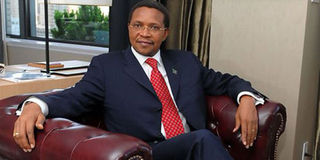Govt abandons JK-championed plan

Retired President Jakaya Kikwete
What you need to know:
- The Citizen has learnt that the government’s move to pull out of the initiative will be announced any time from today by the Global Steering Committee of the OGP during the on-going United Nations (UN) General Assembly in New York.
Dar es Salaam. Tanzania has pulled out of the Open Government Partnership (OGP), throwing into doubt government transparency reforms that had been initiated by Retired President Jakaya Kikwete who championed the initiative.
The Citizen has learnt that the government’s move to pull out of the initiative will be announced any time from today by the Global Steering Committee of the OGP during the on-going United Nations (UN) General Assembly in New York.
Tanzania joined the OGP in 2011 and was the second African country after South Africa to sign for the global initiate whose agenda was to remove the veil of secrecy between the government and the people. More than 70 countries around the world have signed for the OGP.
President Kikwete took centre stage popularising the OGP around the world, with Tanzania hosting its major meeting in the continent in Dar es Salaam in 2015, a year before the General Election.
The OGP meeting in the sidelines of the New York Summit is to advance its agenda on the huge deficit of trust in government and business, and the importance of openness in the effort to win back the trust.
The government is yet to make public its decision to quit the initiative. It was also not clear if any of its officials will take the same message to the steering committee in New York. Foreign Affairs minister Augustine Mahiga will however be representing President John Magufuli at the UN Summit.
Yesterday when asked about the surprise pullout, the Minister of state in President’s Office responsible for Public Service Management and Good Governance, Ms Angela Kairuki declined comment but promised that the government would make it public when the right time comes.
“Listen to me, we (the government) will speak about it when the time is right,’’ Ms Kairuki, who neither confirmed or denied the news, told The Citizen. But the Permanent Secretary in the Ministry of Foreign affairs and East Africa Cooperation, Dr Aziz Mlima, separately confirmed that Tanzania had indeed disengaged from the the OGP plan.
“Yes, it’s true but that is only a temporary move because the government wants to reassess the OGP and find out if it is in line with national interests,’’ Dr Mlima
“There are issues that we need to address first before implementing it [the OGP],” he said. Impeccable sources privy to the happenings confided in The Citizen that President Magufuli’s administration wanted to incline itself more with the Africa Peer Review Mechanism (APRM) that the OGP which it views as western imposed.
Before pulling out, Tanzania had gone through two stages of the OGP action plan and had drafted a third one running from 2016/17 to 2017/18.
Under the three action plans, Tanzania made seven national commitments, including the enactment of the Access to Information Act, Open Budgets, Open Data, Land Transparency and transparency in the extractive sector. There was an additional pledge on the Medical and Health Service Transparency and the Public Performance Management Systems. The rollout has so far achieved mixed results on all fronts. According to Global Integrity (GI), the introduction of OGP in Tanzania created a space in which the government and at least some civil society groups negotiated the changes they wanted around some narrow reform areas.
However, the initiative faced challenges along the way. According to a University of Dar es Salaam (UDSM) lecturer, Mr Faraja Kristomus, the OGP was perceived to be externally driven and hence lacked comprehensive support throughout relevant government departments and ministries.
In a series of reports in The Citizen, Mr Kristomus says the responsible ministries considered OGP to be a new bureaucratic burden rather than a complement to other reforms. “Political tensions within the ruling party from the outset had frustrated efforts for enhanced public transparency,” he says.
Consequently, he says, despite the highlighted efforts that government had shown in implementing the OGP in Tanzania, CSOs eventually accused the government of not honouring its commitments.
A leading civil society activist, Mr Rakesh Rajani, played a key role in encouraging the government to join the OGP initiative. He was among the founding members of OGP’s global Steering Committee. His efforts convinced Mr Kikwete who later embraced the idea of joining the OGP. Mr Rajani currently works as the director of democratic participation and governance at Ford Foundation based in New York.
The Executive Director of the Legal and Human Rights Centre (LHRC), Dr Hellen Kijo-Bisimba, said the government’s decision to pull out of the OGP is yet another clear sign of the shrinking space of democracy and openness in governance in Tanzania.
“The open government initiative was a step in the right direction. It was clear on how the government was going to work with civil society organisations, foreign companies and donors.
“Making the decision to pull out means that we are telling the world that we are not ready to be transparent,’’ said Dr Kijo-Bisimba.
The ACT Wazalendo Party leader and Kigoma Urban MP Zitto Kabwe said that open government was going to be a weapon against corruption.
“Tanzania wasn’t fulfilling all the action plans in the OGP. But I believe it was the right way to go. The decision to pull out was not well-thought out. We are going backwards in terms of good governance,’’ he commented on his official social media account.




